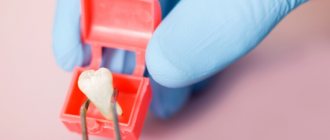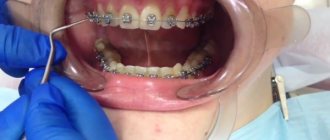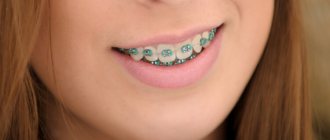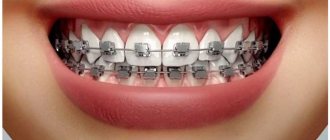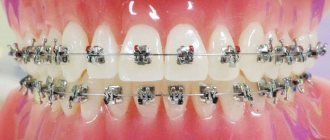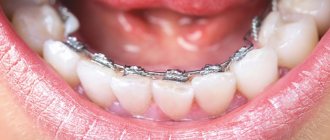1113
Pregnancy is a period when any dental procedures are performed only for serious reasons. Orthodontic treatment with braces is no exception.
As observations have shown, orthodontic construction can provoke the development of a number of complications that have a negative impact not only on the mother’s body, but also on the fetus .
Oral braces: indications for installation
The following indications exist for installing a brace system:
- Some teeth are positioned incorrectly. Wearing the device corrects this problem for a short time.
- An anomaly of the entire dentition or most of the composition. This usually occurs in children during the formation period; if the anomaly is not eliminated in a timely manner, complications may arise.
- The jaws overlap each other - an incorrect bite. In cases where this phenomenon is congenital, the child should be observed by an orthodontist from an early age. If the problem arose due to an injury, then you should not delay treatment either, otherwise the jaw may completely fail to close over time.
- When preparing the oral cavity for implantation or prosthetics. If a patient is missing one or more teeth in a row, this can lead to malocclusion and therefore requires an implant or denture.
- To correct the profile. Sometimes the front oak trees protrude and are not aesthetically pleasing. The bracket system will quickly eliminate the defect.
- It is common that some teeth have not erupted, such as third molars or wisdom teeth. This occurs due to a small jaw size or when the teeth are too closely spaced. This phenomenon is accompanied by pain in the jaw and bad breath. To solve it, it is necessary to either remove a tooth that has not erupted or make room for it by adjusting it with braces.
Recommendations
Typically, the doctor gives pregnant women with braces the same recommendations as regular patients:
- Follow a special diet. You should eat soft, non-sticky and not hot food. Food should not be bitten, but cut into pieces. It is also necessary to combine these recommendations with a healthy diet.
- Eat foods rich in calcium and be sure to take a vitamin-mineral complex.
- Come to the doctor at the time specified by him.
- Take oral hygiene seriously. Due to hormonal changes, even minor plaque on teeth can provoke gingivitis (inflammation of the gums). Dentists even use a special term - “gingivitis during pregnancy.” The disease can begin due to slight redness of the gums, causing it to grow and causing bleeding. The main way to prevent disease is to brush your teeth regularly. If before treatment the orthodontist did not tell you how to do it correctly, ask him yourself.
DETAILS: How to care for your teeth after getting braces
So is it possible to get braces during pregnancy? If the doctor has authorized such an event, then the expectant mother should follow some recommendations:
- Carefully monitor oral hygiene. After all, this is one of the most important moments during the course of treatment. Since a woman’s body is much more sensitive and vulnerable during such a period, braces can provoke some kind of inflammatory process. To avoid trouble, you should pay attention to the condition of your oral cavity after each meal. To simplify this, various means are used specifically for sanitation. These include paste, rinse aid, brush, thread, irrigator. There is no need to ignore daily teeth brushing. As many studies have proven, diseased gums negatively affect the intrauterine development of the fetus.
- Also, the specialist will definitely prescribe the patient to use medications that are designed to strengthen tooth enamel. They also contain calcium. For this reason, the expectant mother will need to follow an appropriate diet, which will include foods rich in vitamins. It is not advisable to create such a diet yourself. It is best to do this with the gynecologist who sees her.
- In this situation, untimely visits to the orthodontist are not recommended. Since the slightest disturbance or inflammatory processes can harm the baby.
What are the types of braces?
There are two types of braces based on the place of attachment in the jaw: internal and external.
Vestibular or external – installed on the outside of the teeth. Quite a few people find it unsightly and experience psychological difficulties while wearing it. Because of this, manufacturers are trying to develop less noticeable systems, but with the same functions. There are several types of braces:
- metal ones are the most popular and inexpensive. The defect is corrected quickly enough;
- plastic – used for easy adjustments when the patient’s case is not complicated;
- ceramic – smooth and invisible, matching the color of tooth enamel;
- sapphire - using precious metals. They differ only in material. More often they are installed by public people, the price is above average.
Lingual or internal - installed on the inside of the teeth. They have the same functions as external ones. More often than not, adults prefer this type because they are invisible. The price is higher than that of vestibular ones. Made from two types of material:
- gold – made of dental alloy with gold. They are safe, hypoallergenic, do not cause discomfort to the patient and do not affect diction at all. They have a high cost;
- metal ones are invisible and the price is almost three times lower than that of gold ones. However, the design differs in thickness, which may cause a pronunciation defect.
Types of correction devices
There are several types of devices depending on where the system is mounted. These are internal and external braces. Let's look at them in more detail:
- External or vestibular ones are installed by orthodontists on the outside of the dentition. The disadvantage of such a system is that it does not look entirely aesthetically pleasing. In this regard, many patients experience psychological discomfort due to wearing such plates.
- Internal or lingual are developed by various brands for a more camphor-like wear from a psychological aspect. They perform the same functions, but the plates themselves are located on the inside of the dentition.
Various materials are used to make braces.
Let's look at them in the table.
| Device type | External | Domestic |
| Material of manufacture | Metal ones are quite popular among children and adults, relatively inexpensive, and quickly help get rid of the defect. | Metal ones are relatively inexpensive, quickly cope with uneven teeth, but due to their significant volume they often lead to some difficulties with pronouncing words. |
| Plastic – used in mild cases for easy correction of the dentition. | Gold ones are highly expensive, completely safe and hypoallergenic for the patient, and do not cause problems with the pronunciation of words. | |
| Ceramic - almost invisible on the teeth, matched to the color of the enamel, but their cost is quite high. | ||
| Sapphire ones are usually very expensive and are often installed by public people. |
You might be interested in: Second week of pregnancy
Each patient selects a device for himself depending on the material of manufacture, price and other personal preferences.
A specialist will help you choose the right type of system for each patient. Children usually have external braces. Adults prefer indoor devices.
Is it possible to get braces during pregnancy?
During pregnancy, a woman receives many prohibitions: certain diets, acceptable physical activity, refusal of certain cosmetic and medical procedures. But is it possible to install braces during this period?
At what time is it better to bet?
Most doctors do not recommend installing braces during pregnancy. This is due to the fact that a hormonal imbalance occurs in a woman’s body, which in turn provokes softening of bone tissue. If systems are installed at the same time, there will be a double load on the bones and it is unknown how the dental composition will behave.
The installation process itself is unpleasant, and being in an interesting position, a woman needs to experience as little stressful situations and experiences as possible.
Another reason is constant surveillance. Braces require constant adjustment, because the teeth gradually shift and in order for this to happen in the right direction, the process must always be monitored. Due to pregnancy, frequent visits to consultations, and sometimes poor health, a woman in labor may miss dental appointments.
No doctor can guarantee that the teeth will move into the correct places if the procedure is performed during the gestational period.
Which braces option is better to choose?
If a woman decides to install braces, then the choice must be agreed with the doctor.
He will select the most suitable option, taking into account individual characteristics. The patient should follow the recommendations:
- It is advisable to cure all teeth and remove stones before conception;
- It is also better to take an x-ray before pregnancy;
- During the entire period of wearing braces, you need to carefully observe oral hygiene; in addition to a regular toothbrush, you need a special brush.
If mommy still decides
Sometimes the expectant mother nevertheless decides to install a braces system while carrying the baby. At the same time, it is very important to choose a good clinic and an experienced specialist, and also weigh the pros and cons of this action. The doctor must select a corrective device for the patient, taking into account all her characteristics. In this case, a woman should adhere to the following recommendations:
- Prepare teeth and cure all diseases, including removing tartar. It is advisable to do this before conception.
- Take a picture using an x-ray. It is also best to do this before pregnancy.
- Throughout the entire period of wearing the corrective device, carefully observe the rules of oral hygiene. To clean your braces you will need a special brush.
If you experience any warning symptoms, such as bleeding gums, pain or bad breath, you should contact your doctor immediately.
Reviews from doctors and patients indicate that with correct installation and wearing of correction plates, various complications rarely occur.
How long to wear during pregnancy
The wearing time of the system is individual, depending on the condition of the patient’s teeth.
Whether or not to wear braces during pregnancy is a purely individual matter and depends on many factors, so a woman should consult a doctor.
If a woman becomes pregnant and has already worn braces, she should definitely consult a dentist to adjust the treatment.
It is not recommended to remove the system, because it is not known how the teeth will fit.
If they begin to crumble, then the doctor will most likely decide to remove them and use retention guards for a while.
Installation complications
Changes in hormonal levels associated with bearing a child also affect the condition of the oral cavity: often during an examination, the dentist reveals gingivitis, swelling and proliferation of gum tissue. The pathology occurs in most expectant mothers; after childbirth, the hormonal levels return to normal and the signs of the disease also disappear.
During the gestation period, the body's immune system is also characterized by a decrease in protective functions, which can lead to the rapid growth of pathogenic flora of the oral cavity and the addition of a secondary bacterial component to the inflammatory processes of the gums.
Thus, pregnancy can be considered one of the factors influencing the development of dental diseases. Therefore, correcting a woman’s bite requires the doctor to take into account the characteristics of the body during the period of gestation.
Serious complications when installing braces may be associated with the unstable emotional state of a pregnant woman
Installing and wearing an orthodontic appliance for a patient in position can lead to serious complications:
- The lack of minerals and vitamins in the body of the expectant mother contributes to the development of the process of disruption of the structure of the roots of the teeth, as a result of which a change in their shape, size, twisting, and displacement of the teeth can occur. The pressure exerted by the medical device will only make the situation worse.
- Inflammation of the jaw bone tissue, which requires immediate medical treatment
- Psychological discomfort associated with the unstable emotional state of the pregnant woman and the inconvenience caused by the procedure for installing and wearing braces
- The design of the orthodontic apparatus requires careful and regular care of the oral cavity, otherwise the development of caries and inflammatory processes of the gums is possible. Decreased immunity during pregnancy increases the risk of such diseases
- Installation of braces is possible only on healthy teeth, therefore all treatment and sanitation of the oral cavity is carried out by the dentist before the actual procedure. A doctor, in order to monitor the condition of the dentition, may prescribe an x-ray of a woman’s jaw, and this method of examination has a negative impact on the health of the mother and the child in her womb.
Important! Before deciding to install braces, a pregnant woman should consult with a gynecologist and orthodontist to determine the risks of the procedure and possible consequences for the body.
What painkillers can you take when installing braces?
If anesthesia is necessary, the doctor selects an approved drug for the gestational period, usually these are drugs based on Ultracaine. To eliminate discomfort in the oral cavity after the procedure, you can take acceptable analgesics, but of course, only after the recommendation of a doctor. The safest are Paracetomol, Papaverine suppositories, Buscopan.
Straight teeth are not only beautiful and aesthetically pleasing, they are confidence in your own attractiveness. A pregnant woman should consult a doctor if she is installing braces. Many dentists recommend postponing procedures until the postpartum period.
Reviews
Almost all reviews about wearing braces during pregnancy boil down to comments and concerns not so much about the result, but about the health of the unborn child. However, some advice for patients based on popular comments can be made:
- If the braces are placed in the first trimester, then wearing them is accompanied by increased diction problems, periodic nausea and tongue injuries. There is nothing you can do about it, the main thing is to endure the peak of discomfort.
- It is believed that sapphire designs are the best option for pregnancy. The material is fixed and acts on the enamel as delicately as possible; the risks of allergies and soft tissue injuries are minimal.
- Wearing braces while breastfeeding is not recommended only for women in labor with calcium deficiency. This happens often because the body takes time to replenish its supply of minerals. In such a situation, it is better to postpone any manipulations with teeth for at least six months.
- Under no circumstances should you try to fix the device yourself if chips, shifts and other signs of damage appear on the locks. If you notice something like this, you must immediately go to the clinic, otherwise there is a risk of serious injury.
- The dosage of multivitamin complexes is determined only by a doctor. You should not self-medicate, hoping to strengthen your teeth at home - such behavior is guaranteed to harm the health of the unborn child.
DETAILS: Who wore braces incognito
Do they install braces?
Some women are interested in the question of whether braces are installed during pregnancy. Although most specialists look at this critically and consider it an undesirable process, they still agree that with the right approach, if there are no contraindications, this orthodontic structure can be installed. At the same time, the expectant mother must strictly adhere to all recommendations and take the necessary vitamins so as not to harm the child.
During pregnancy, the female body experiences serious stress under the influence of hormonal changes. For this reason, not every specialist will be able to foresee exactly how this will affect the bite correction course.
Although nowadays, as technology develops, braces do not interfere with the patient at all during correction. However, for pregnant women there is still a great risk that the most unexpected complications may arise.

